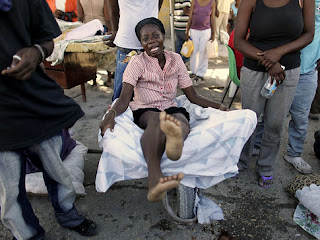
A friend of mine wrote and asked me what my take is on the statements being made about the earthquake in Haiti being God's judgment for sin. Is it good theology or not?
Well...the answer is "yes" and "no."
Support for the "yes, it is good theology to say that God uses catastrophes to judge nations, cities, and individuals for their sin" is found throughout Scripture. Common examples would include Noah's flood, Sodom and Gomorrah, and the judgment on Israel after David's census. The prophetic books consist of chapter after chapter detailing God's chastisement on nations for their national sins. Even in the New Testament we read of promised judgment on "Babylon" in the book of Revelation. After all, the main writer of the New Testament made this bold statement: "The wages of sin IS death"...all the time, every time. One really cannot come away from a thorough reading of Scripture and doubt that it is a good understanding of the nature of God that He is the Ultimate Judge of sin and that when His judgment falls it is swift and sure.
SO....all that said...is
Pat Robertson right? Was the earthquake and devastation in Haiti the direct result of their national sin of voodooism? Well, it very well could be.
However, there is also much Scriptural support for the "No, it is bad theology to say that catastrophe is the result of God's judgment." There is an entire book in the Bible that backs up this claim: The Book of Job. Remember Job's friends? Their theological understanding was actually quite right. God does punish sin. However, their application of that theology was quite wrong. God does punish sin...but He was not punishing Job. There was more to the story that had not yet been revealed.
Jesus actually answered this question for us in Luke 13:1-5. As He was teaching, men came to him and asked about a current news event: Pilate had some worshipers slaughtered right in the Temple courts. "What do you think about this, Jesus?" Jesus' response was to bring up another natural event (the decay of some towers that had fallen and crushed 18 men) and then to use both of the current events to drive home this Truth: "Do not suppose that these men were greater sinners because of their fate. No, listen to Me on this point: Unless you repent, you will all perish just like they did."
Note that Jesus did not say that the men who died were not sinners. He simply said they were not GREATER sinners than anyone else standing there that day. I believe there are a few principles we can draw from the way Jesus responded to these two tragedies of His day:
1. Great suffering does not necessarily equate with great sinning. Be careful not to confuse the two. Gold is cast into the fire to be purified just the same as chaff is cast in to be consumed.
2. Do not make use of current events to criticize those who are suffering, as if their sin is any worse than your own.
3. Tragedy should cause us to examine our own need for repentance.
4. Our place is to preach Truth (which includes that the wages of sin is death) and to leave the judgment in the hands of the Judge. Remember, God's harshest words in the book of Job were reserved for Job's friends who had good theology but bad application.
So...was it God's judgment on sin? Well, sure. All of the negative effects that come from living in a fallen world are the results of sin. I doubt, however, that the sins of those Haitians were any more despicable in the eyes of God than my own sins. I deserve judgment just as much as they did...and without repentance my judgment is just as sure.
Let's remember that there are parts of the Great Story we have not yet read. Watch the news, pray for the suffering, do what we can to ease that suffering....and look into our own hearts because, as Jesus said, "unless you repent, you will all likewise perish." (Luke 13: 5)




